June marked the 25th Anniversary of Gramercy! Thank you to our valued investors, trusted business partners and team members without whom this milestone could not have been reached. We are excited for the opportunities we see ahead, and look forward to continuing to deliver upon our mission to have a positive impact on the well-being of our clients, portfolio investments (and their communities) and our team members.
Contents
Market Overview
Macro Review
“Higher for longer” was the dominant theme that reverberated across global markets this week. As widely expected, the FOMC left interest rates unchanged on Wednesday, but maintained a hawkish tone and moved the median dots projections for the end of 2024 and 2025 50bps higher. Predictably, UST yields and the Dollar moved higher, placing riskier assets, including EM, under pressure. The fact that the Bank of England (BoE) and Swiss National Bank (SNB) defied expectations and paused their respective tightening cycles did not help much in the context of the Fed’s “higher for longer” signaling and duration remained under pressure . The BoJ also remained on hold, while Norges Bank and Riksbank both lifted rates by 25bps. Meanwhile, final Euro Area CPI for August was confirmed a touch lower than expected, fueling hopes that it could cool down further to below 5% in September, which could help markets regain some optimism that rates in Europe might have peaked. Oil prices remained well supported amid supply concerns, with Brent crude marking a new ten-month high close to $95 per barrel. In EM, the Central Bank of Brazil (BCB) cut the benchmark SELIC rate by 50bps to 12.75% and signaled that the easing cycle is likely to continue at the same pace in the coming months. Turkey’s economic team held meetings with international investors in New York and London to reassure them that the ongoing shift in economic management under the leadership of MinFin Mehmet Simsek is sustainable and has President Erdogan’s full support. To reinforce the message, the Central Bank delivered a second consecutive 500bps rate hike to 30% as part of normalizing monetary policy and guided that more tightening measures are coming. Egypt and South Africa kept rates unchanged as the authorities are looking toward elections in the former and fiscal tightening in the latter. Pakistan also announced a date for national elections in January 2024, alleviating near-term political uncertainty, and committed to meeting outstanding targets under its IMF program to unlock much needed fresh external financing.
EM Credit Update
Emerging market sovereign credit (cash bonds) ended the week 0.8% lower with spreads 1bp wider. Corporate credit was 0.4% weaker this week despite spreads being 3bps tighter. Sovereign outperformers over the week included El Salvador, Mongolia, and Suriname, while Argentina, Pakistan and Zambia underperformed. Amid the “higher for longer” theme on DM rates and strong USD, EM local debt lost 0.8% this week.
The Week Ahead
Next week, the market focus will be on Federal Reserve officials as they provide more context around their median dots projections and explain what they need to see in order to hike rates again this year. Also, both preliminary headline and core inflation will be released in the Euro Area. It will be a busy week for CEE central bank-watchers as the Czech and Hungarian Central Banks hold monetary policy meetings and Poland reports September inflation that is expected to show further decline.
Highlights from emerging markets discussed below: Turkey’s Central Bank reinforces policy normalization shift with another 500bps rate hike, The Central Bank of Brazil (BCB) cuts the Selic rate by 50bps and signals further easing and Pakistan provides clarity on election timing and commitment to delivering on IMF program targets.
Fixed Income
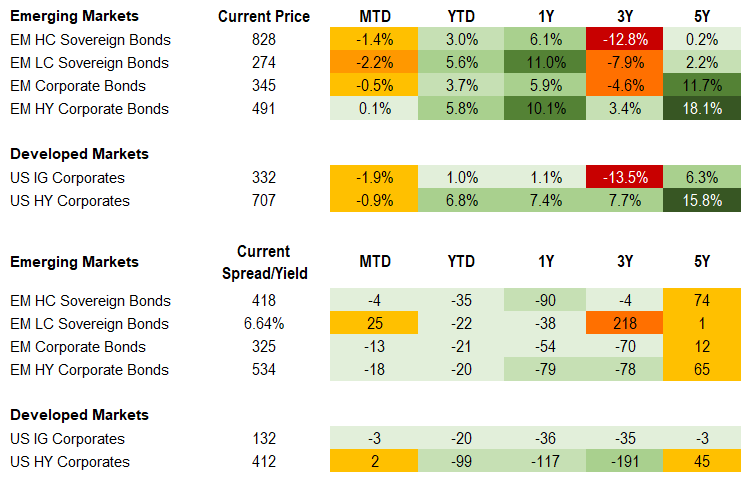
Equities
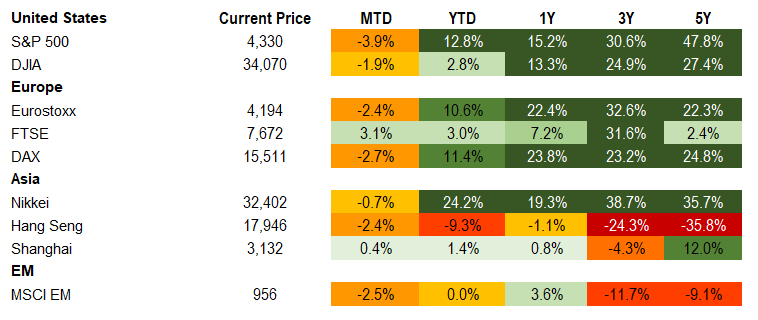
Commodities

Source for data tables: Bloomberg, JPMorgan, Gramercy. EM Fixed Income is represented by the following JPMorgan Indicies: EMBI Global, GBI-EM Global Diversified, CEMBI Broad Diversified and CEMBI Broad High Yield. DM Fixed Income is represented by the JPMorgan JULI Total Return Index and Domestic High Yield Index. Fixed Income, Equity and Commodity data is as of September 22, 2023 (mid-afternoon).
Emerging Markets Weekly Highlights
Turkey’s Central Bank reinforces policy normalization shift with another 500bps rate hike
Event: The Central Bank of Turkey (CBT) delivered a 500bps rate hike to 30% and provided forward guidance that further gradual tightening of monetary policy is forthcoming.
Gramercy commentary: This week’s 500bps hike, in addition to the clear signals that more policy tightening is in the pipeline supports the view that the ongoing gradual but major shift in economic management under Minister of Finance Simsek, has President Erdogan’s blessing and is likely to continue in the coming months. We expect the CBT’s main policy rate to end the year at 35% after another 500bps of tightening in 4Q and to reach 40% by the first quarter of next year. We believe that risks are on the upside of our base case given that elevated sticky inflation (projected at around 65% YoY at year-end 2023) and the recent spike in global energy prices might require even more forceful tightening by the authorities to restore confidence in Turkey’s inflation targeting regime. As Minister Simsek declared in meetings with investors in New York this week, attaining price stability is his team’s main priority in the near-term. In that context, we expect further monetary policy tightening to be complemented by regulatory measures to slow credit growth as well as quantitative tightening measures such as higher reserve ratio requirements for bank FX and FX-protected deposits, among others. Additional priorities include rebalancing GDP growth toward exports rather than domestic demand and rebuilding FX reserves buffers. All of this marks a material market-friendly departure away from the economic heterodoxy of the recent past, which is credit positive, and we believe has President Erdogan’s endorsement. However, we caution that Minister Simsek’s ambitious macro stabilization program could face resurfacing political constraints if it drives significant deceleration in economic activity ahead of the important municipal elections in March 2024.
The Central Bank of Brazil (BCB) cuts the Selic rate by 50bps and signals further easing
Event: The monetary policy committee of the Brazilian Central Bank, the COPOM, cut its benchmark SELIC rate by 50bps to 12.75% in a unanimous decision for the second straight time and signaled a similar pace of policy easing in 4Q.
Gramercy commentary: Having been on the forefront of the monetary response to the post-pandemic inflationary spiral, the BCB is now leading EM in unwinding the policy tightening. Given inflation levels of around 5% and high real interest rates, the authorities have ample space to support economic activity with gradually lowering rates further in the coming months. As such, we expect the COPOM to retain the 50bps rate-cutting pace at the last two meetings for the year and bring the policy rate to 11.75% by year end. Meanwhile, recent data showed that the economy performed better than expected in the first half of this year, supported by a record high harvest, demand for services and a strong labor market. However, the BCB expects that activity will likely slow in coming quarters. This, in combination with headline inflation projected by the authorities at around 3.5% YoY and medium-term inflation expectations being re-anchored, should allow monetary policy easing in Brazil to continue apace in 2024, creating a “goldilocks” environment for local assets, in our view.
Pakistan provides clarity on election timing and commitment to delivering on IMF program targets
Event: The Election Commission of Pakistan announced that national elections will be held in the last week of January, alleviating concerns that polls could be delayed further and removing political uncertainty over the timing into 2024. The interim caretaker government also signaled commitment to maintaining fiscal prudence and achieving the IMF program targets, following discussions between Interim Prime Minister, Kakar and IMF Managing Director, Kristalina Georgieva.
Gramercy commentary: A smooth election process would provide some welcome relief for an economy battered by high inflation, low growth, and pressured currency. The elections were originally supposed to take place in November, three months after the dissolution of the National Assembly, but were postponed as constituencies were redrawn following a new census. Although delayed to January 2024, holding the vote should help improve investor sentiment, all else being equal. Meanwhile, Pakistan’s authorities appear to be on track to meet the main IMF targets ahead of the program review in November. Those include reduction of the Central Bank’s swap book to $4.2 billion, meeting its net domestic assets (NDA) target of Rs15 trillion and its net international reserves target of $14.6 billion, and refraining from lending to the government. Additionally, favorable trends in non-oil imports, rice prices and cotton production bode well for the net export balance, while expected disbursement of the second IMF tranche in December should ease FX pressures.
Emerging Markets Technicals
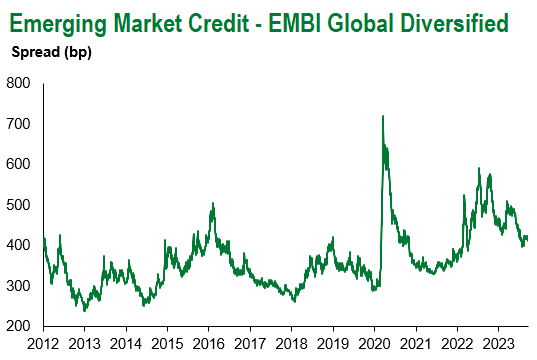
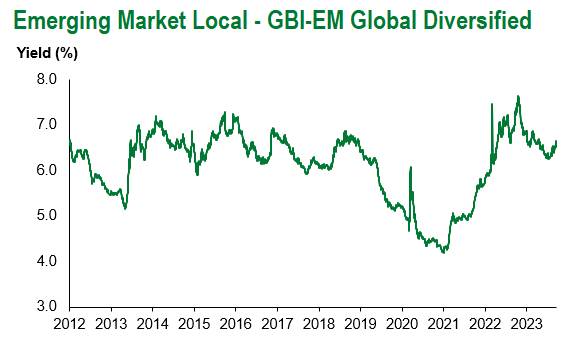
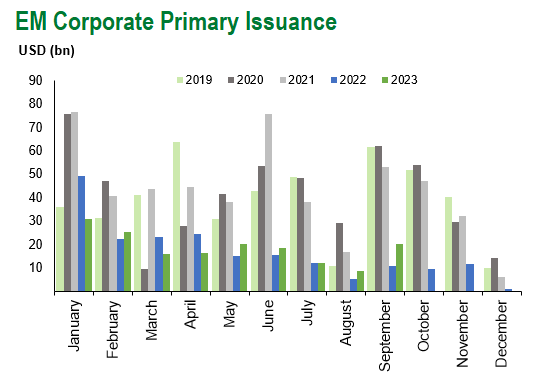
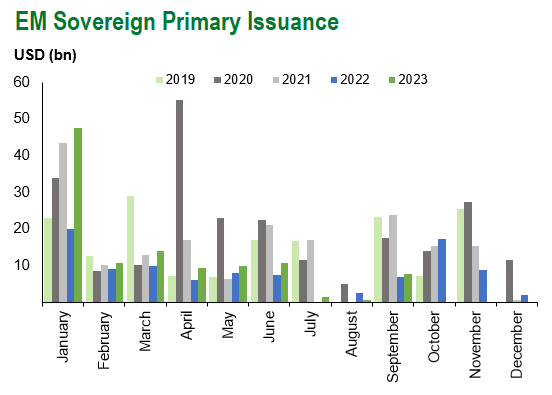
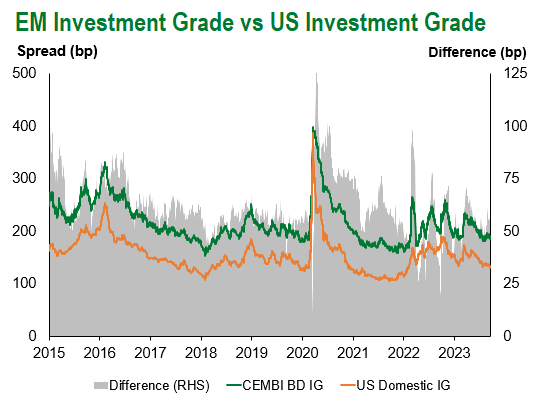
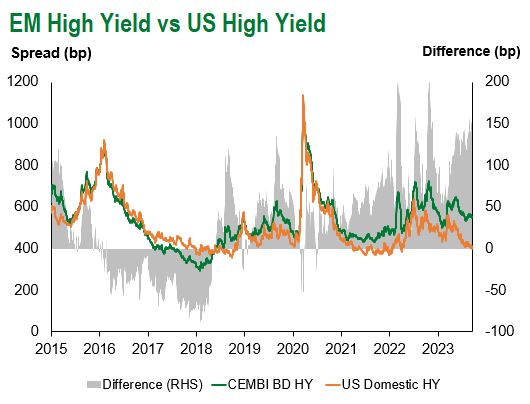
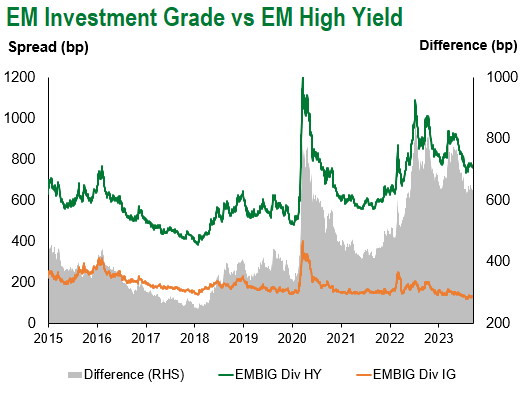
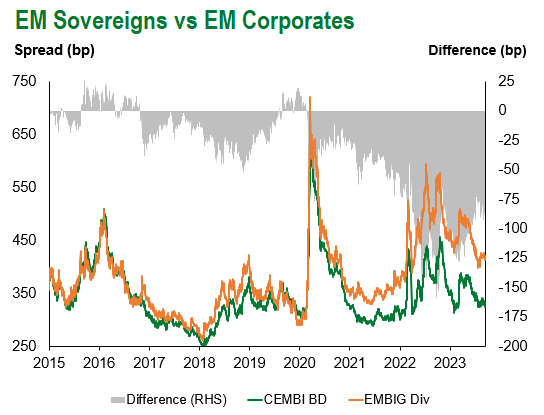
Emerging Markets Flows
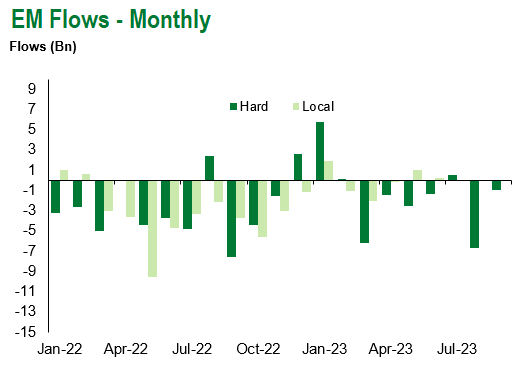
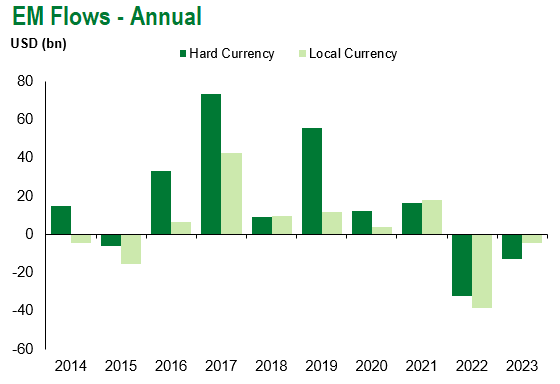
Source for graphs: Bloomberg, JPMorgan, Gramercy. As of September 22, 2023.
For questions, please contact:
Kathryn Exum, CFA ESG, Director, Co-Head of Sovereign Research, [email protected]
Petar Atanasov, Director, Co-Head of Sovereign Research, [email protected]
James Barry, Director, Deputy Portfolio Manager, [email protected]
This document is for informational purposes only. The information presented is not intended to be relied upon as a forecast, research or investment advice, and is not a recommendation, offer or solicitation to buy or sell any securities or to adopt any investment strategy. Gramercy may have current investment positions in the securities or sovereigns mentioned above. The information and opinions contained in this paper are as of the date of initial publication, derived from proprietary and nonproprietary sources deemed by Gramercy to be reliable, are not necessarily all-inclusive and are not guaranteed as to accuracy. This paper may contain “forward-looking” information that is not purely historical in nature. Such information may include, among other things, projections and forecasts. There is no guarantee that any forecasts made will come to pass. Reliance upon information in this paper is at the sole discretion of the reader. You should not rely on this presentation as the basis upon which to make an investment decision. Investment involves risk. There can be no assurance that investment objectives will be achieved. Investors must be prepared to bear the risk of a total loss of their investment. These risks are often heightened for investments in emerging/developing markets or smaller capital markets. International investing involves risks, including risks related to foreign currency, limited liquidity, less government regulation, and the possibility of substantial volatility due to adverse political, economic or other developments. References to any indices are for informational and general comparative purposes only. The performance data of various indices mentioned in this update are updated and released on a periodic basis before finalization. The performance data of various indices presented herein was current as of the date of the presentation. Please refer to data returns of the separate indices if you desire additional or updated information. Indices are unmanaged, and their performance results do not reflect the impact of fees, expenses, or taxes that may be incurred through an investment with Gramercy. Returns for indices assume dividend reinvestment. An investment cannot be made directly in an index. Accordingly, comparing results shown to those of such indices may be of limited use. The information provided herein is neither tax nor legal advice. Investors should speak to their tax professional for specific information regarding their tax situation.
